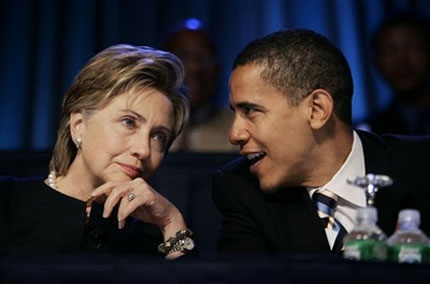Clinton set to end campaign, back Obama
(Agencies)
Updated: 2008-06-07 13:29
Updated: 2008-06-07 13:29
Washington - As Barack Obama basks in his historic accomplishment as the first black US presidential nominee, Hillary Clinton ends her groundbreaking effort as the first woman to go as far as she did in the quest for the White House.
 In this July 19, 2006, file photo Hillary Rodham Clinton speaks with Sen. Barack Obama (right) during the annual convention of the National Association for the Advancement of Colored People in Washington. [Agencies] |
Clinton plans to host a rally for supporters on Saturday where she will formally drop out of the contest and throw her support behind her rival of the last 16 months.
Obama, the senator from Illinois, clinched the Democratic nomination on Tuesday when a number of superdelegates, who can back any candidate, flocked to his camp.
"On Saturday, I will extend my congratulations to Senator Obama and my support for his candidacy," Clinton said in an e-mail to supporters.
"This has been a long and hard-fought campaign, but as I have always said, my differences with Senator Obama are small compared to the differences we have with Senator McCain and the Republicans," she said. "I will be speaking on Saturday about how together we can rally the party behind Senator Obama."
Obama is not slated to appear at the rally at noon in Washington, but the extent of Clinton's endorsement will be of keen interest to the Obama camp. She won more than 17 million voters during the Democratic battle, and Obama will need many of those to defeat Republican John McCain in November.
DELAYED DECISION
For some Democrats, Clinton's decision to drop out comes later than they would have liked. They would have preferred her to end her bid on Tuesday, when it became clear that Obama had enough delegate support to win the race.
Instead Clinton chose that moment to declare she would not make a decision before consulting with party leaders and supporters. While that evoked cheers of defiance from her most fervent backers, other Democrats wished she had been a more gracious loser.
A day of conversations with key supporters drove home the message that Clinton's bid was over and she needed to stand behind the presumptive nominee for the sake of party unity.
Speculation remains over whether Obama might consider her as his vice presidential running mate. He and Clinton, who has expressed an openness to the idea, met privately on Thursday in Washington.
But the suggestion of a so-called unity ticket of Obama and Clinton is controversial among Democrats hoping to regain the White House after eight years of Republican control under President George W. Bush.
Some see the pairing as a way to unite their two divergent constituencies -- he won support among urban, affluent, more educated voters while she appealed more to voters who were rural and working class.
Others cringe at the thought, seeing little upside in taking on board Clinton, a powerful yet polarizing figure who brings reminders of her sharp attacks on Obama during the primaries. There are also the issues of her husband former President Bill Clinton's racially charged comments and enraged outbursts and a her campaign debt of more than $20 million.
Since their meeting, Obama has told reporters to stop asking him about his vice presidential thoughts because he will not tip his hand. And Clinton's campaign has issued a statement that she was not seeking the vice presidential slot.
Some say the more significant unity ticket is one that joins Clinton's big-donor fundraisers with Obama's successful grass-roots operation that has wooed many smaller donors.
|
||
|
||
|
|
|
|